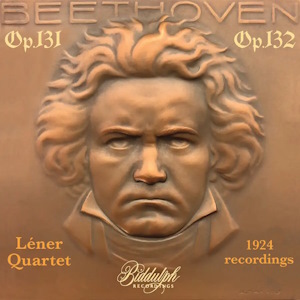
Ludwig van Beethoven (1770-1827)
String Quartet in C sharp minor, Op.131 (1826)
String Quartet in A minor, Op.132 (1825)
Léner String Quartet
rec. 1924, London
Biddulph 85042-2 [83]
Pristine Audio has been active in the restoration of the Léner Quartet’s recordings and before them Rockport whilst Japanese EMI reissued the Beethoven quartet cycle in three boxes. Opus Kura has chipped in too. Now here’s Biddulph, extending the discography backwards by presenting two late acoustics, made in 1924. Collectors will know that the Hungarian ensemble was the first to record the Beethoven Quartets in full, a project that took about a decade. What’s less well-known is that they began recording for English Columbia as early as 1922 with a series of discs focusing on the standard repertoire – Haydn, Mozart, Schubert – either in full or abridged form or sometimes just single movements. Their presence in the studios was largely because the leading British quartet of the time, the London, was absent on world tours and making sporadic and hardly earth-shattering discs for American Columbia. Into Columbia’s quartet lacuna stepped the Léner and when the London returned to the fold they were to find themselves severely hemmed in by the highly popular Hungarians.
These two Beethoven quartets should be of interest to specialist collectors and are ancillary to the electric recordings that followed in 1932 (Op.131) and 1935 (Op.132). The ensemble’s rich tonal qualities are audible even via the recording horn – a slightly blurrily reproduced photograph in the booklet shows the quartet in the studio at an acoustic Columbia recording session, horn very visible – a quality that gave their performances on disc such communicative and expressive depth. The performances of the acoustic and electric remakes are largely consistent in terms of tempi – maybe the opening movement of Op.131 is the more expressively indulged in the acoustic recording – and it’s this sheer consistency of purpose that is so admirable.
Clearly the second movement of Op.131 caused either the group or Columbia problems as the three days in February 1924 allocated for the recording were augmented by one in August to remedy what had gone wrong – I suspect it was a need for absolute ensemble clarity that eluded the group. The fugal playing in the fourth movement is especially fine and it’s noticeable that they are a minute slower here than they were in their electric recording – 14 minutes to the 13 they took in 1932. Sonically, the acoustic recording tends to favour the highest and lowest voices so that Jenő Léner and Imre Hartmann tend to be slightly clearer than the inner voices of second violin József Smilovits and violist Sándor Róth – but that’s a marginal matter and this and the companion recording show that, despite the relative flatness of this kind of recording, where nuance is at a premium, a remarkable amount of detail can be heard.
Op.132 was recorded over two days in November 1924. Again, consistency of conception shines from this performance seen in the context of their electric remake. In the two recordings made over a decade apart, three of the five movements each differ by no more than ten seconds. The tempo for the Heiliger Dankgesang is one of those movements, superbly consistent over the years, and played with a rapt intensity that’s neither too lagging nor too superficially fast. When their turn came to record it in 1934, their old rivals in the London Quartet took this movement far faster and their corporate sonority was much leaner than the richly voiced Hungarians.
Tully Potter’s notes are admirable though he’s always banging on about the Busch Quartet when a more focused look at the Columbia quartet roster would yield more instructive and focused information. The transfers are good if somewhat airless for my tastes and some side-joins can be felt when surface noise increases on the side turn. Otherwise, collectors will relish the chance to compare and contrast these admirably played recordings with the much better-known electrics.
Jonathan Woolf
Help us financially by purchasing from


















